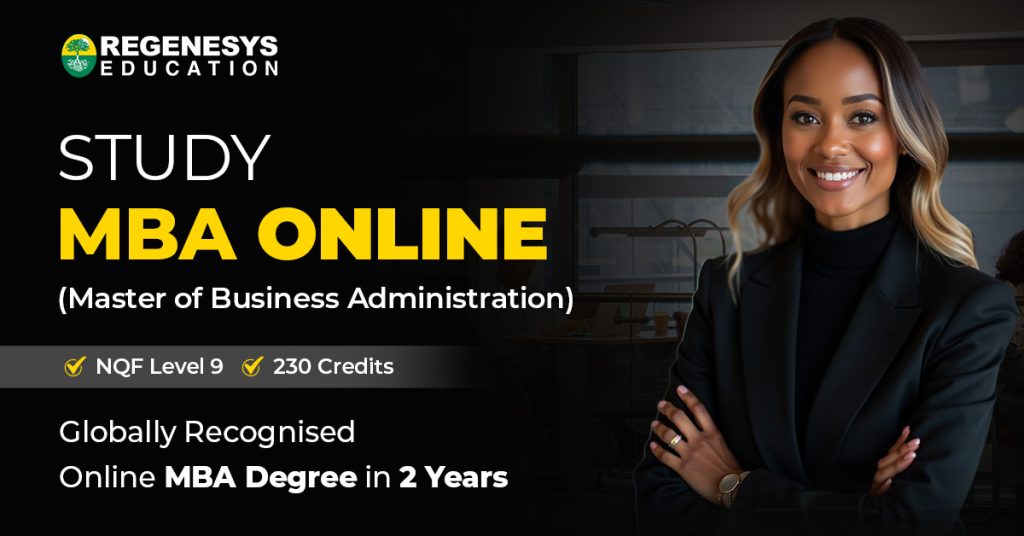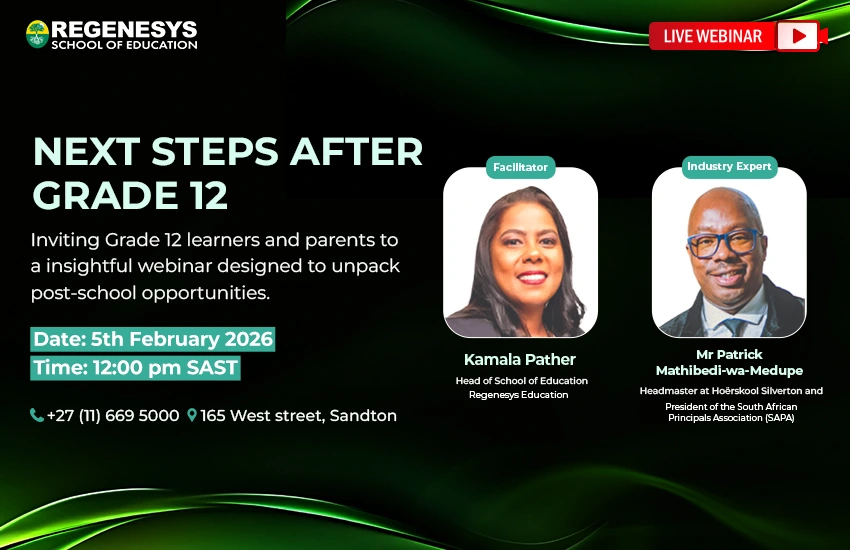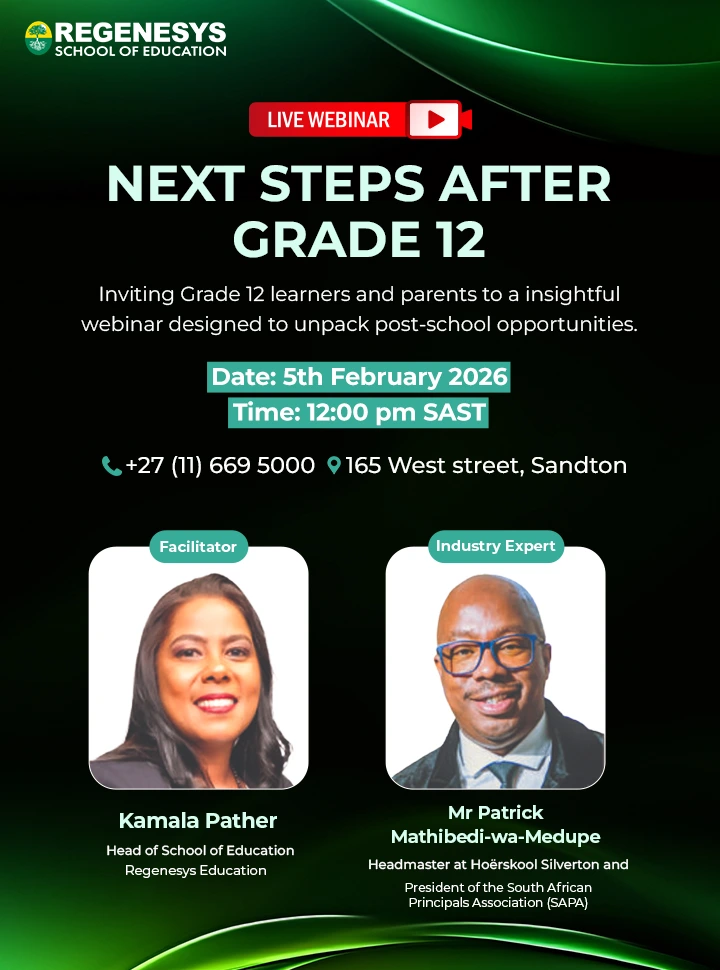Understanding the ideal work experience for MBA applications is key to improving your chances of admission into a competitive programme. Most business schools, including those in South Africa, recommend a work experience range of 2–5 years for MBA applicants. However, the right amount of experience can vary depending on the type of MBA, your career goals, and the maturity you bring to the programme. Early-career candidates may qualify through strong leadership potential, while experienced professionals must show progression and managerial exposure.
In this article, we will explore the ideal work experience for MBA applicants, the differences between junior and senior entry points, experience expectations per school, and how the Regenesys MBA aligns with different career stages.
Table of Contents
- Why Work Experience Matters in MBA Admissions?
- Recommended MBA Experience Range: 2–5 Years
- Early-Career MBA Eligibility: Is Less Experience a Barrier?
- Experienced Professional MBA: When You Have 6+ Years of Experience
- How Does MBA Type Affect Experience Requirements?
- Experience Expectations per Business School
- Regenesys MBA: Work Experience as a Key Admission Requirement
- Senior vs Junior Entry: Who Has the Advantage?
- Maturity of Applicants: A Non-Negotiable Trait
- Aligning Leadership Exposure with MBA Readiness
- Conclusion
- Ideal Work Experience for MBA – FAQ

Why Work Experience Matters in MBA Admissions?
Work experience plays a pivotal role in the MBA admissions process. It is one of the key factors admissions committees use to evaluate an applicant’s readiness for postgraduate business education. Your experience not only influences your ability to contribute meaningfully to class discussions but also demonstrates your understanding of the real-world business environment.
In South Africa, as in other global regions, MBA qualifications are designed to equip students with advanced managerial and leadership skills. Therefore, candidates are expected to bring practical insights and lessons from their workplace into the academic setting. Admissions panels assess your progression, leadership exposure, and how your experience aligns with the programme objectives.
If you are considering applying for a Master of Business Administration in South Africa, it’s crucial to assess whether your current career journey reflects the maturity and professional development expected at this level – and whether it matches the ideal work experience for MBA.
Know MBA Programme in South Africa: Career, Fees & Skills here

Recommended MBA Experience Range: 2–5 Years
Among various business schools and MBA forums, the widely accepted recommendation is a minimum of two and a maximum of five years of full-time, post-graduation work experience. This range reflects a balanced phase where the applicant is neither too early in their career to lack context nor too advanced to be disengaged from foundational learning.
The following are key reasons why the ideal work experience for MBA is considered to fall within this range:
1. Development of Core Competencies – In the first few years of professional work, individuals typically acquire essential skills such as communication, teamwork, problem-solving, and project coordination. These competencies are foundational for MBA coursework and group assignments and closely match the ideal work experience for MBA.
2. Career Clarity – Applicants with a few years of experience are more likely to have explored different roles, industries, or functions, giving them a clearer vision of their career direction. This clarity enhances their classroom engagement and participation.
3. Leadership Exposure Alignment – By the third or fourth year of professional work, many individuals begin to take on leadership tasks such as mentoring, leading a project, or managing a small team. This practical leadership experience complements the theoretical learning in an MBA programme.
4. Easier ROI Justification – The return on investment for an MBA makes more sense when applicants can quickly translate their degree into promotions or career advancement. Candidates in the 2–5-year range often have the ideal work experience for MBA and see faster results.

Early-Career MBA Eligibility: Is Less Experience a Barrier?
Not everyone fits neatly into the 2–5-year window, and that’s perfectly acceptable. Some MBA applicants are recent graduates or professionals with less than two years of full-time experience. While this group may face additional scrutiny during admissions, they can still qualify for MBA programmes if other aspects of their profile are strong.
Below are some conditions under which early-career applicants can still meet the ideal work experience for MBA expectations through alternative strengths:
1. Strong Academic Background – High academic achievement, particularly in quantitative or analytical fields, helps demonstrate readiness for the rigours of an MBA programme.
2. Demonstrated Initiative – Internships, part-time jobs, campus leadership roles, and entrepreneurial ventures can serve as alternative indicators of professional maturity aligned with the ideal work experience for MBA.
3. Clear Career Goals – Admissions committees appreciate early-career applicants who can articulate why they want an MBA now and how it fits into their long-term vision.
4. Exceptional Communication Skills – Strong interview and essay responses help compensate for a shorter work history by reflecting maturity, thoughtfulness, and clarity – key traits in any candidate striving toward the ideal work experience for MBA.
If you fall under this category, consider applying to programmes that offer tailored tracks for early-career candidates, such as accelerated MBAs or integrated MBA degrees.
Find out Who Should Study an MBA? Benefits and Career Paths Explained here!

Experienced Professional MBA: When You Have 6+ Years of Experience
At the other end of the spectrum, some applicants may have over six years of experience, often in managerial or specialised roles. These candidates bring depth and real-world insights to the classroom but must also demonstrate why now is the right time for an MBA. Although their experience exceeds the standard ideal work experience for MBA, they must still prove their fit and readiness for the programme.
Below are the expectations and characteristics of experienced professional MBA applicants:
1. Managerial Responsibilities – Applicants should be able to show that they have led teams, handled significant budgets, or managed client relationships.
2. Strategic Thinking – Demonstrating the ability to make long-term decisions, handle uncertainty, and guide teams through complex challenges is highly valued.
3. Career Transitioning or Scaling Up – Many experienced applicants pursue MBAs to pivot into new industries, shift into executive roles, or formalise their leadership capabilities.
4. Fit for Executive or Modular MBAs – These formats offer the flexibility and curriculum focus suitable for more advanced professionals balancing full-time work.
Such candidates are advised to explore institutions that offer executive-style MBA programmes or modular designs that allow for maximum flexibility.
How Does MBA Type Affect Experience Requirements?
Choosing the right MBA type is just as important as meeting the work experience requirement. Each programme is designed to serve a specific career stage and professional goal. Therefore, understanding the alignment between your current experience level and the programme’s structure helps determine if you meet the ideal work experience for MBA. So, whether you are just starting out or are already in a senior role, there is likely a format tailored to your profile.
Here’s an overview of how different MBA types align with professional experience levels:
|
MBA Type |
Recommended Experience |
Best Fit For |
|
Traditional Full-Time MBA |
2–5 years |
Mid-level professionals aiming for upward mobility |
|
Executive MBA (EMBA) |
7+ years |
Senior professionals or managers |
|
Online/Part-time MBA |
3–8 years |
Working individuals who want to study while employed |
|
Accelerated or Early-Career MBA |
0–2 years |
High-potential graduates with clear goals |
Understanding the programme type fit helps you apply strategically and match your profile to the expectations.
Know MBA Return on Investment in South Africa: Is It Worth It in 2025? here!
Experience Expectations per Business School
Each business school has its own perspective on the value and type of work experience applicants should bring. Some schools prioritise leadership development, while others emphasise academic readiness or professional achievements. These variations mean that your application strategy should be customised according to the institution’s admission criteria. Understanding the unique experience expectations of MBA school can significantly improve your chances of being accepted.
In South Africa, private institutions and public universities often have distinct expectations:
1. Private Institutions – These schools tend to adopt a holistic admissions process, where work experience is considered alongside leadership potential, communication skills, and personal goals.
2. Public Universities – Typically, place more weight on years of experience, often requiring at least 3 years in a managerial or strategic role.
3. International Accreditation – Institutions that follow global standards (such as EQUIS or AMBA accreditation) might expect higher quality and quantity of work experience, especially in leadership contexts.
Make sure to review each school’s experience thresholds per school before applying, as they influence the likelihood of admission.
Regenesys MBA: Work Experience as a Key Admission Requirement
The Regenesys Master of Business Administration is designed for ambitious professionals ready to take on leadership roles in a global business environment. A cornerstone of the programme is relevant work experience, which serves as both a foundation for classroom learning and a lens for leadership development.
Key aspects of Regenesys MBA experience requirements include:
1. Ideal for Mid-Career Professionals – The Regenesys MBA aligns closely with the ideal work experience for MBA, particularly targeting applicants within the 2–5-year range.
2. Leadership Exposure Alignment – Applicants are expected to have demonstrated initiative, project leadership, or team management.
3. Curriculum Built on Experience Sharing – The programme encourages practical learning through case studies and peer interaction, which is only effective when students bring real-life experience.
4. Flexible Study Options – Available in both contact and online formats, Regenesys allows working professionals to balance their job and academic commitments.
In addition, Regenesys offers a Recognition of Prior Learning (RPL) pathway for individuals who already possess significant expertise or practical knowledge in business. This route allows eligible candidates to fast-track their MBA and, depending on the outcome of their assessment, potentially complete the qualification within one year.
Senior vs Junior Entry: Who Has the Advantage?
While many applicants focus solely on how many years of work experience they have, admissions panels look deeper into the substance of that experience. What truly matters is the quality, relevance, and growth shown during those years. The MBA classroom thrives on diversity of thought and experience, and both senior and junior candidates bring valuable perspectives that enrich peer learning.
Here are some comparative insights:
- Junior Entry Candidates: May have shorter experience but compensate with strong academic records, clarity of vision, and high potential for growth.
- Senior Entry Candidates: Bring depth of experience and can enrich classroom discussions, but must show openness to learning and career reinvention.
- Equal Opportunity: Both profiles are accepted as long as the applicant presents a compelling reason for pursuing the MBA at that stage.
Maturity of Applicants: A Non-Negotiable Trait
Regardless of experience length, admissions panels look for signs of maturity. This includes the ability to reflect, take responsibility, and communicate purposefully. Maturity helps determine whether a candidate is truly ready to handle the academic workload and group dynamics of an MBA programme. It also signals how well an individual will adapt to future leadership roles.
Traits that demonstrate maturity include:
- Self-awareness: Recognising your strengths, acknowledging weaknesses, and having clear reasons for pursuing an MBA.
- Professionalism: Respecting others, meeting deadlines, and maintaining a constructive attitude in group settings.
- Growth Mindset: Embracing feedback, learning from setbacks, and being open to personal and professional growth – all essential for those within the ideal work experience for MBA range.
Explore How to Choose the Right MBA Programme in South Africa? here!
Aligning Leadership Exposure with MBA Readiness
MBA qualifications in South Africa often emphasise leadership as a key learning outcome. If your current role already involves elements of leadership – even informally – it strengthens your application and positions you well within the ideal work experience for MBA range. Leadership exposure shows that you are not just a participant in workplace processes but also a contributor to strategic outcomes.
Here are examples of how leadership exposure might look:
- Leading Small Teams: Managing junior colleagues or interns shows your ability to coordinate, guide, and take responsibility.
- Project Leadership: Handling a project from start to finish shows initiative, planning skills, and accountability.
- Mentorship or Peer Training: Helping others learn or grow highlights your collaborative mindset and informal leadership skills.
Explore MBA Future in South Africa: Key Trends and Career Opportunities here!

Conclusion
There is no one-size-fits-all answer to the ideal work experience for MBA, as each candidate brings a unique combination of skills, goals, and leadership potential. While 2–5 years of professional experience tends to offer the best alignment for full-time and part-time programmes, many applicants succeed with more or fewer years – provided they show maturity, clarity of purpose, and readiness to contribute meaningfully.
At Regenesys Business School, we understand that potential isn’t defined by years alone. Whether you are starting out or looking to advance further, our MBA programme is designed to support your growth.
Apply now and take your next step towards becoming a future-ready leader.
Ideal Work Experience for MBA – FAQ
What is the ideal work experience for MBA applications?
The ideal work experience for an MBA is typically in the range of 2–5 years. This range offers a good balance of experience, maturity, and flexibility.
Can I apply for an MBA without any work experience?
While possible, it is rare. Most schools, especially in South Africa, prefer candidates with some post-qualification work experience. However, strong academics and leadership exposure may improve your chances.
Do Executive MBAs require more work experience?
Yes, Executive MBA programmes generally require 7 or more years of experience, with at least 2–3 years in managerial roles.
Does my experience have to be in business to apply for an MBA?
No. Experience in non-business fields like healthcare, education, or NGOs is also valued, especially if it includes leadership, decision-making, or strategic involvement.
How does Regenesys evaluate work experience?
Regenesys considers relevant work experience that demonstrates leadership readiness, industry knowledge, and professional maturity as part of its admission process.
Is too much work experience ever a disadvantage?
If not presented well, excessive experience might raise questions about your flexibility or adaptability. It is important to demonstrate a willingness to learn and grow, regardless of your seniority.







